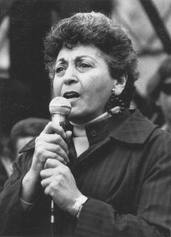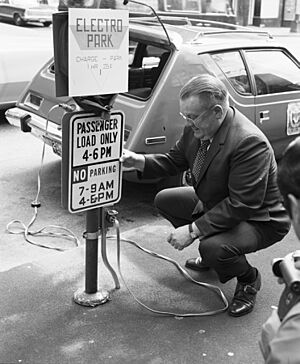Clara Fraser facts for kids
Clara Fraser (March 12, 1923 – February 24, 1998) was an important political organizer. She believed that women's rights and workers' rights were connected. She helped start two important groups: the Freedom Socialist Party and Radical Women.
Quick facts for kids
Clara Fraser
|
|
|---|---|
 |
|
| Born | March 12, 1923 |
| Died | February 24, 1998 (aged 74) |
| Organization | Radical Women |
| Political party | Freedom Socialist Party |
Contents
Clara Fraser's Life Story
Growing Up and Becoming an Activist
Clara Fraser was born in 1923 in East Los Angeles, California. Her parents were Jewish immigrants. Her father, Samuel Goodman, was a truck driver (a Teamster) and believed in anarchism, which means he thought people should organize themselves without a government. Her mother, Emma Goodman, worked in clothing factories and later became a leader in the International Ladies' Garment Workers' Union.
When Clara was in junior high, she joined the youth group of the Socialist Party of America. This group believed in a society where everyone is equal and works together.
After finishing college at the University of California, Los Angeles in 1945, Clara became interested in the ideas of Leon Trotsky. He was a revolutionary who disagreed with Stalinism, a harsh form of communism. Clara joined the Socialist Workers Party (SWP) that same year.
She moved to Chicago and helped workers form a union at a department store. In 1946, she moved to Seattle to help build the SWP's local group there.
Clara worked as an electrician on an assembly line at Boeing. In 1948, she joined a big strike there. When the union was told they couldn't protest, Clara organized a "mothers' brigade." These mothers walked the protest line with baby strollers to show their support. After the strike, Boeing fired Clara and put her on a blacklist. This meant it was hard for her to find other jobs because of her activism. The FBI also watched her for ten years.
Starting the Freedom Socialist Party and Radical Women
In the 1950s and 1960s, Clara Fraser continued to be very active. She worked to help workers, end segregation (keeping people of different races apart), support women's rights, and protest the Vietnam War.
She worked with her husband at the time, Richard S. Fraser. They developed an idea called "Revolutionary Integration." This idea explained that the fight for socialism (a society where everyone is equal) and the fight for African American freedom were connected. They believed that Black leaders were very important for the working class in the U.S.
Inside the SWP, Clara disagreed with the party's support for the Nation of Islam. The Seattle group tried to convince the national party to change its mind. But the party became less democratic, and their efforts stopped. Clara helped write documents that criticized the SWP. These writings were later published as a book called Crisis and Leadership.
In 1966, the Seattle group left the SWP. They then started the Freedom Socialist Party (FSP). This new party believed that people who were often left out of society should lead the way to progress for everyone. In 1967, Clara also formed Radical Women (RW) with Gloria Martin and other young women. RW wanted to teach women how to be leaders, understand important ideas, and become more aware of their shared experiences as workers.
Working at Seattle City Light and Fighting for Rights
After being fired by Boeing and blacklisted, Clara had trouble finding a steady job. She worked as a receptionist for seven years. Then she got a job helping with a federal program to fight poverty. Later, Seattle City Light hired her.
In 1973, Clara started working at Seattle City Light as a training coordinator. Her job was to create a program to help women get jobs in electrical trades. This was an "affirmative action" program, meaning it aimed to help groups that had faced unfair treatment in the past.
Gordon Vickery, the head of City Light, hired Clara for political reasons. He wanted to run for mayor. He hoped that a successful program for women would help him avoid lawsuits about discrimination, like those filed by Black workers earlier.
Clara used her connections in the feminist community to find women for the program. Over 400 women applied for just ten spots. Three of the women chosen (Megan Cornish, Heidi Durham, and Teri Bach) were members of Radical Women.
Clara made sure the women in the program were trained and worked together. They got two weeks of physical and classroom training, including swimming. They also joined the union, IBEW Local 77, right away.
In 1974, Vickery introduced strict new rules for employees. In response, over 1000 City Light employees walked out on April 10, 1974. Clara helped organize the non-union office workers, mostly women, and their support was key to the walkout's success. Vickery's new rules were dropped, and workers felt more united.
However, relations between Clara and Vickery became difficult. Clara was removed from her role as the women's training coordinator. In July 1975, she was laid off without warning. This was officially due to budget cuts, but many saw it as punishment for her actions. The women's training program was also ended in September 1975, and most of the trainees were laid off.
Clara was initially denied unemployment benefits and told to pay back money she had received. But she protested publicly, and these charges were dropped. In June 1976, a man with less experience filled Clara's old job.
After being fired, Clara filed a complaint saying she was discriminated against because of her political beliefs and because she was a woman. After a seven-year legal fight, Clara won! The ruling confirmed that workers have the right to speak out against management and organize for themselves. She returned to her job at City Light.
Clara then joined other women and men who supported "affirmative action" to form a new group. It was called the Employee Committee for Equal Rights at City Light (CERCL). They worked to fight discrimination based on gender and race.
The Freeway Hall Case
In 1984, a former member of the FSP, Richard Snedigar, sued Clara and seven other party leaders. This case became known as the Freeway Hall case.
Snedigar wanted back a large donation he had given years earlier to help the party get a new office. He also demanded to see the FSP's meeting notes, member lists, and names of people who had donated money. At one point, Clara and the party's lawyers were almost sent to jail for refusing to share financial information. But their sentences were stopped and later overturned.
The FSP took this case all the way to the state Supreme Court. A lawyer named Leonard Boudin argued that the right to privacy is important for people to be able to express different opinions. In 1992, the FSP finally won the case.
Later Life and Death
Clara Fraser had two sons, Marc and Jon. She passed away on February 24, 1998, from a lung disease called emphysema.
See also
 In Spanish: Clara Fraser para niños
In Spanish: Clara Fraser para niños
- Megan Cornish
- Heidi Durham
- Seattle City Light
- Freedom Socialist Party
- Radical Women


